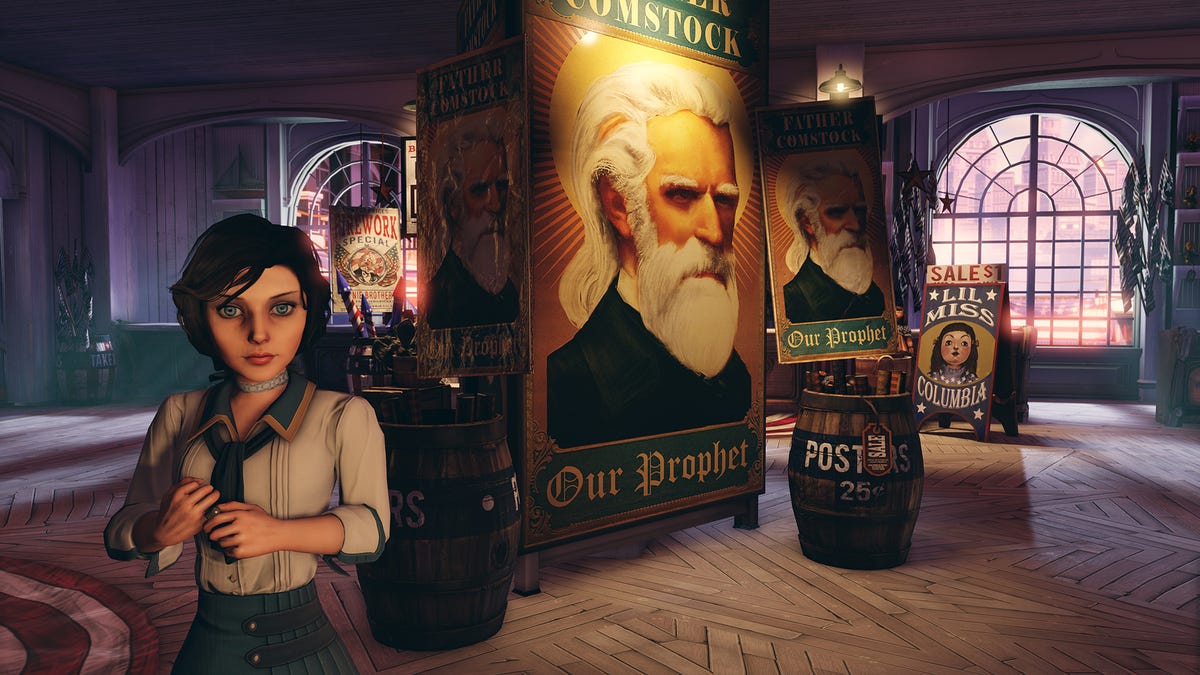BioShock Infinite and games as edutainment
Can (and should) video games teach history and politics?

The current intellectual darling of the video game set is BioShock Infinite, the third game in a retro-flavored action/adventure series. Like the original BioShock (let's forget the drab second installment for now), Infinite is ambitious in its storytelling, working in references to history and political philosophy in a way rarely seen in interactive entertainment.
But why is that so rare? Big-budget mainstream films don't feel the need to shy away from explorations of philosophy and psychology ("The Matrix," "Inception") or politics ("Argo") -- despite having at best a couple of hours to interact with the audience, rather than the dozen-or-more hours most games demand.
Before they became everyday political buzzwords, the ideas of Ayn Rand and Objectivism were introduced to a sizable number of gamers by the original BioShock. Throughout the underwater city of Rapture, recordings, written messages, and propaganda posters pushed a vision of self-sufficient individualism, with the not-so-subtle message that it's a political philosophy inevitably leading to ruin, with drug-addled splicers running in the streets (or underwater traffic tubes). Or, perhaps the idea itself was sound, but the execution was flawed -- that's up to the player to decide after witnessing the events of the game, making for a fairly uncommon experience.
Finding that exactly right mix of entertainment and education is tough. There's an entire genre of educational games, usually tagged as "edutainment," which is about as fun as it sounds, from blasting aliens with math equations or dry history trivia quizzes (there's a special place in gaming history, however, for Typing of the Dead). Of late, edutainment apps on iOS have somewhat rescued this moribund genre.
On the other side are games with important historical settings, including several entries in the Call of Duty series, that only use historical context as the slightest of window dressing. These usually offer next to no real context or actual history, outside of random cameo appearances (hey, it's Robert McNamara in Call of Duty: Black Ops!) and some filler text on loading screens. Historical strategy games, covering everything from ancient Rome to the Napoleonic Wars, do better, but are restricted to a smaller, self-selected audience.
The smarter way the BioShock series handles edutainment reminds me of the early years of classic sci-fi TV series "Doctor Who." Back in the black-and-white 1960s, the show would alternate between sci-fi story lines ("The Daleks") and ones set in a reasonably fact-filled historical context, with no sci-fi or supernatural elements ("The Aztecs").
In this particular case, it's the exploration, perhaps lightly touched on, of late 19th/early 20th century America that really caught my attention when BioShock: Infinite was first introduced two years ago. At the time, the historical underpinning of the game's universe was pitched as covering everything from the concept of American Exceptionalism to the Wounded Knee Massacre to eugenics (there's an excellent breakdown of some of the real-life historical highlights here). Unlike, say, World War II or today's global conflicts, it's a period of history very rarely touched on by video games (understandable, what with the lack of robots or rocket launchers in that era).
And if you think video games are unfairly targeted by politicians looking to protect sensitive minds from inappropriate material, look up the history of the the roughly contemporaneous Comstock Act, which may be inspiration for the game's Father Comstock character.
Hanging on my office wall are a couple of BioShock: Infinite promotional posters, which are slightly retouched versions of actual World War I propaganda posters, retitled to reference the floating renegade city of Columbia (you can see one of the original posters here). It's interesting to note, however, that as BioShock: Infinite has built-in buzz toward becoming a mainstream hit, with TV commercial and bus shelter ads, almost all of that has been pushed aside in the marketing messages, overshadowed by action, shootouts, and yes, some very robotic-looking creatures.
But, if that gets you to try the game, it may be worth it. So far, I've only played through the first couple of hours of BioShock: Infinite, but I was impressed with the immersive experience and storytelling. It's only the mildest of spoilers, but you'll spend the first long chunk of the game simply exploring and talking to characters, and getting some historical context (occasionally too broadly painted with obvious exposition: "Oh, have you heard about the Vox Populi?")
Credit must go to lead designer/producer Ken Levine, one of the few auteur-level people able to really stamp a game (such as the recently rereleased classic System Shock 2) with a personal style, much as film directors such as Quentin Tarantino, Martin Scorsese, and Werner Herzog can do. And Levine is clearly interested in touching on the conflict between individuals and society, the role of government, and whether a group of like-minded individuals can form and sustain a highly specific separate community (hint: that answer appears to be "no").
In fact, once the shooting eventually started, I found myself wishing I could have instead spent even more time talking to citizens and reading about the political intrigue and cultural mores of Columbia. There's only so fresh first-person shooting can feel, no matter the game's setting.
Will BioShock: Infinite set dozens of copycat games in motion, mixing action and exaggerated historical fiction? Judging from what we saw after the original BioShock, probably not -- maybe more a few more steampunk-style games at best.
That's a shame, because most games, no matter how glittery the graphics or how many Hollywood stars contribute voice-overs, manage to pack exactly zero ideas into their dozen-plus hours of playtime, unless you're really interested in learning which silencer attachments go with which rifle or why alien species A wants to eat alien species B.

